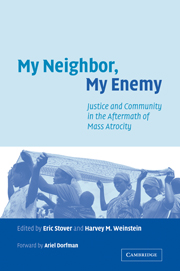Book contents
- Frontmatter
- Contents
- List of contributors
- Foreword by Ariel Dorfman
- Acknowledgments
- Introduction: conflict, justice and reclamation
- Part I Institutional approaches to justice
- 1 A world unto itself? The application of international justice in the former Yugoslavia
- 2 Legal responses to genocide in Rwanda
- 3 Localizing justice: gacaca courts in post-genocide Rwanda
- 4 Exhumation of mass graves: balancing legal and humanitarian needs
- 5 Witnesses and the promise of justice in The Hague
- 6 Reparations in the aftermath of repression and mass violence
- Part II Social reconstruction and justice
- Part III Survivors and justice
- Conclusion: a common objective, a universe of alternatives
- Index
2 - Legal responses to genocide in Rwanda
Published online by Cambridge University Press: 05 May 2010
- Frontmatter
- Contents
- List of contributors
- Foreword by Ariel Dorfman
- Acknowledgments
- Introduction: conflict, justice and reclamation
- Part I Institutional approaches to justice
- 1 A world unto itself? The application of international justice in the former Yugoslavia
- 2 Legal responses to genocide in Rwanda
- 3 Localizing justice: gacaca courts in post-genocide Rwanda
- 4 Exhumation of mass graves: balancing legal and humanitarian needs
- 5 Witnesses and the promise of justice in The Hague
- 6 Reparations in the aftermath of repression and mass violence
- Part II Social reconstruction and justice
- Part III Survivors and justice
- Conclusion: a common objective, a universe of alternatives
- Index
Summary
In the aftermath of the 1994 Rwandan genocide, both the international community and the government of Rwanda have placed substantial emphasis on the prosecution of alleged perpetrators, in part because they hope that justice will promote social reconstruction. With trials at the International Criminal Tribunal for Rwanda (ICTR) based in Arusha, Tanzania, in national courts in Belgium and Switzerland, in classical courts in Rwanda, and in an innovative, local judicial system, gacaca, the Rwandan genocide has received greater judicial attention than any other case of mass atrocity in recent history. Because of the military defeat of the regime that carried out the genocide and the willingness of many countries to support judicial processes, a very substantial number of the alleged perpetrators have been apprehended and are awaiting trial. Hence, Rwanda might provide an excellent case for determining whether trials do in fact contribute to reconciliation.
Yet each of the judicial initiatives has been beset with problems, and the contribution of the sum of their activities to reconciliation remains unclear. Both international and domestic prosecutions have focused exclusively on the genocide, while war crimes and crimes against humanity allegedly perpetrated by some power-holders in the post-genocide regime have been ignored, compromising the appearance of fairness in judicial processes. The Arusha Tribunal has remained detached from Rwandan society, focusing more on legal processes and contributions to international law than on its potential impact within Rwanda. Domestic prosecutions, meanwhile, have been politicized.
- Type
- Chapter
- Information
- My Neighbor, My EnemyJustice and Community in the Aftermath of Mass Atrocity, pp. 49 - 68Publisher: Cambridge University PressPrint publication year: 2004
- 15
- Cited by

